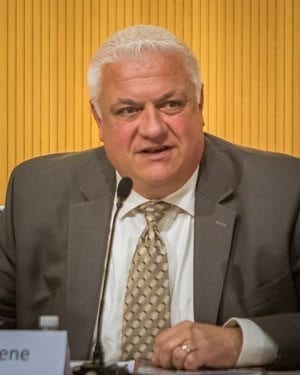Port commissioner candidates detail plans for port if elected
VANCOUVER — Voters gathered at the Vancouver Community Library on October 12 for the final general election voters forum hosted by the League of Women Voters of Clark County. The forum gave candidates in several Vancouver races the opportunity to answer questions asked by moderator Nancy Barnes.
One of the races covered Thursday night was the race for Port of Vancouver commissioner, District 1. The candidates running for the position are Kris Greene and Don Orange. Brian Wolfe, current commissioner for District 1, is not seeking reelection.

Greene owns an insurance agency in Vancouver and if elected hopes to bring in up to 3,000 family wage jobs to the port.
Orange owns a small business near the port, and said that he decided to run for the commissioner position because of a lack of transparency at the port.
The candidates were first asked to describe the decision making process of the port and its boundaries, and if they would try change anything about that process.
“I believe that the process is a good, sound process,” Greene said, but noted that there is room for improvement. He said that the current decision making process is relatively standard for ports. Greene said that the process allows the port to operate and weigh the benefits of different development opportunities.
“We need transparency,” Orange said. Decisions made by the port authority can affect workers in the port and Vancouver residents, he said.
Orange said that the decisions made by the port that affect residents need to be made in front of those residents.
The candidates were asked to outline what infrastructure needs should be prioritized, and what their role as commissioner should be in meeting those needs.
Greene said that the city of Vancouver has a traffic congestion issue related partly to the location of the port. He said that there needs to be a new commercial corridor for truck traffic into the port. In order to accomplish this, however, Greene said that further study would be necessary to outline specific needs.
Orange said that the major need for the port was to have a new Interstate 5 bridge. Much of the freight leaving the Port of Vancouver travels over the I-5 bridge, Orange said. It is an old structure, and can cause delays when the drawbridge is lifted or when there are traffic accidents that increase cost and slow distribution of port products, according to Orange.
Both candidates were asked if the Port of Vancouver is prepared to respond to an accident that affects the port, as well as the surrounding environment and community.
“Yes, the port is currently prepared to handle accidents,” Greene said. He then addressed concerns that have arisen about the safety possibilities of a potential new oil terminal at the port. Greene said that Washington has an Energy Facility Site Evaluation Council that is tasked with evaluating energy facilities.

The council would work to determine the safety of any new oil terminal development, Greene said. If the governor approves the terminal, “there is going to be a measurable increase in the amount of safety equipment that will be available at the port,” Greene said.
Orange said that the major safety concern about the port is any potential damages resulting from the construction of, or accidents at, the proposed oil terminal. He said that local firefighters have said that they are not equipped to meet the safety hazards posed by the terminal.
“They’ve asked us not to build this very dangerous setup,” Orange said, “We should listen to them.”
After outlining the port’s ability to handle accidents and safety issues, the candidates had the opportunity to describe why they are running for the position and what they believe to be the most important role of a port commissioner.
Greene said that he is running because he wants to “bring family wage jobs to our region.” By developing properties in the port to attract light industrial, light manufacturing and green jobs as well as technology companies, Greene said that he hopes to create a port that means residents can find family wage jobs without having to leave the area.
Orange said that he wants to protect the safety of the community and to ensure transparency in port operations.
“I think the most important job is safety,” Orange said. He said that there is a need to develop family wage jobs and draw in industry such as metal trades and machinery. By creating family wage jobs on the Washington side of the Columbia River, the community can be strengthened, Orange said.
Current development in the Port of Vancouver includes the West Vancouver Freight Access Project, which is designed to improve rail service to the port. The moderator said that this project was conceived originally with the oil terminal as part of the plan. Candidates had the opportunity to detail the benefits of the project even if the oil terminal is rejected.
Greene said that even without an oil terminal, there is “huge demand” for the tracks on port property. The project has been developed in such a way, Greene said, that other companies can use the tracks. The most significant reason for the project “was to improve the overall safety of the corridor and allow for a larger Terminal 1 and waterfront development,” Greene said.
According to Orange, the rail at the port “is some of the best there is anywhere.” Even in the absence of an oil terminal, the rail can be used to support roll-on, roll-off freight such as farm equipment and automobiles. The rail development also can be used to move components for wind turbines and other energy products, Orange said. Orange also said that rail is vital to grain transport in the area.
Both candidates were asked how they believe the Port of Vancouver should expand over the next five years to contribute to economic development in Clark County.
Greene said that currently, there is a 99.4 percent occupancy rate for companies seeking space of 3,000 to 25,000 square feet in the county. This means that there is a major impact on family wage jobs, he said. Part of the job for a commissioner will be to seek out and develop new properties on or near the port that can be used to provide jobs, Greene said.
Orange said that there is already property along rail lines in the port district that should be more developed. The port needs to work to move as much freight as possible, he said. Trade can be volatile, and Orange said that 70 percent of the income of the port comes from moving freight across its docks.
The governments of Canada and the United States are interested in negotiating a new Columbia River Treaty to help manage the upper reaches of the river. Greene and Orange were asked how the treaty could affect the Port of Vancouver.
Greene said that one of the main provisions of the treaty concerns mitigating flood areas on the northern portion of the river. He said that he is concerned that water management in the summer months could adversely affect barge traffic going upriver and originating from the Port of Vancouver. Greene said that he hopes the port would have a part in negotiating a new treaty.
Orange said that the a new treaty would have more room for environmental concerns in it. “We need to be listening to the environmental needs of the communities,” Orange said.
Orange’s residency challenged
One topic not addressed at the Oct. 12 voter forum was a challenge to Orange’s residency and consequently his ability to run for the District 1 port commissioner position.
On Aug. 24, Carolyn Crain of Vancouver and Jason Atkins of Camas filed a challenge to Orange’s voter registration, alleging that Orange did not live at the address at which he is registered to vote, and therefore was not eligible to run for the port commissioner position.
In the original challenge filed by Crain and Atkins, Crain stated that she did not believe Orange resided at an apartment within District 1 of the Port of Vancouver. The address for the apartment was used by Orange to register to vote.
The challenge alleged that Orange has lived at a house outside the Port of Vancouver boundaries since the 1980s, and that his voter registration was consequently invalid.
A hearing was held on Sep. 20 at the Auto Licensing and Elections Building in Vancouver with Clark County Auditor Greg Kimsey presiding.
In a Sep. 22 written decision, Kimsey dismissed the challenge to Orange’s voter registration. He said that Crain and Atkins’ challenge did not meet the required burden of proof to challenge Orange’s registration.
The decision stated that Orange provided evidence such as his drivers license and vehicle registration that show he has resided at the apartment since March.
In the case of a challenge to someone’s voter registration, the burden of proof rests on those filing the complaint. Kimsey’s decision stated that Crain and Atkins did not meet the burden of proof, and therefore dismissed the challenge.




